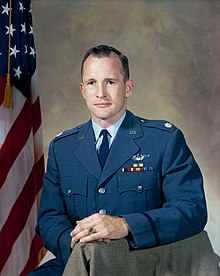Ed White | |
|---|---|
 White in 1966 | |
| Born | Edward Higgins White II November 14, 1930 San Antonio, Texas, U.S. |
| Died | January 27, 1967 (aged 36) Cape Kennedy, Florida, U.S. |
| Resting place | West Point Cemetery |
| Education | United States Military Academy (BS) University of Michigan (MS) |
| Awards | |
| Space career | |
| NASA astronaut | |
| Rank | Lieutenant Colonel, USAF |
Time in space | 4d 1h 56m |
| Selection | NASA Group 2 (1962) |
Total EVAs | 1 |
Total EVA time | 36m |
| Missions | Gemini 4 Apollo 1 |
Mission insignia | |
Edward Higgins White II (November 14, 1930 – January 27, 1967) was an American aeronautical engineer, United States Air Force officer, test pilot, and NASA astronaut. He was a member of the crews of Gemini 4 and Apollo 1.
After graduating from West Point in 1952 with a Bachelor of Science degree, White was sent to flight training, and assigned to the 22nd Fighter Day Squadron at Bitburg Air Base, West Germany, where he flew the F-86 Sabre and F-100 Super Sabre fighters. In 1958, he enrolled in the University of Michigan to study aeronautical engineering, receiving his Master of Science degree in 1959. White then received test pilot training at Edwards Air Force Base, California, before being assigned as a test pilot for the Aeronautical Systems Division at Wright-Patterson Air Force Base, Ohio.
White was selected as one of the second group of astronauts, the so-called "Next Nine", who were chosen to take part in the Gemini and Apollo missions. He was assigned as pilot of Gemini 4 alongside command pilot James McDivitt. On June 3, 1965, White became the first American to walk in space. He was then assigned as senior pilot of the first crewed Apollo mission, Apollo 1. White died on January 27, 1967, alongside astronauts Virgil "Gus" Grissom and Roger B. Chaffee in a fire during pre-launch testing for Apollo 1 at Cape Canaveral, Florida. He was awarded the NASA Distinguished Service Medal for his flight in Gemini 4 and was then awarded the Congressional Space Medal of Honor posthumously.